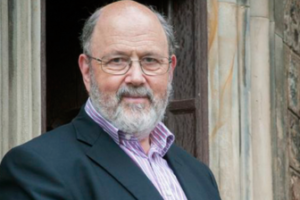A significant shift took place last week in the Church of England. The office of Archbishop of Canterbury was conferred upon Justin Welby, former Bishop of Durham. In my short time living in Durham (I moved here in late September), it has been interesting to see this process unfold. Although Rowan Williams announced his retirement from the office last March, the selection process was rather clandestine until three potential candidates were named last Autumn. With the news that Justin Welby was being considered there was both excitement for the great potential he might bring to this highest position in the Church of England, and a tinge of sadness that he would be leaving his post here. At his recent farewell ceremony at the Durham Cathedral, the general consensus was that he is the right man for the job and great hope has been placed in his leadership at these crucial times.
I asked a friend who is studying here at St. John’s College and Cranmer Hall to share his insights into the new Archbishop. Joshua Penduck is an ordinand of the Anglican Church working on a degree in the theology department here at Durham University and serves as the representative of the Cranmer Student Community[1] to the wider student community of St. John’s College. He had the opportunity to interact with Justin Welby when he was the Pastoral Assistant at Liverpool Parish Church.
Jeanette: There has been a lot of enthusiasm here in Durham, and especially among those of us who are members of St. John’s College and Cranmer Hall since it was here that Archbishop Welby trained to become an Anglican priest. What can you tell us about Archbishop Welby’s background: his coming to faith, his calling into ordination, his training here in Durham, and his ministry?
Joshua: Just out of Cambridge, Justin Welby landed a top job in oil. After several years of success in the industry and after experiencing personal tragedy, he started going to church. He came to faith at Holy Trinity Brompton and after attending the church for a while, a minister asked him how he could live out his Christian faith in the oil industry. This question led him into a journey ultimately to being ordained. The transition to Cranmer was difficult for Welby. He left his successful career to end up in a place of being told what to do. But there he learned humility, and he is a very humble man to this day.
After completing ordination through Cranmer, he held a few appointments which led to his being Canon and then sub-Dean of Coventry Cathedral. He was quite young for the role, but he did a lot of good. He opened up the Centre for Reconciliation which brought him into contact with the Nigerian Church. He has been very involved with the Nigerian church.
From Coventry, he went on to be Dean of Liverpool which is where I met him. In Liverpool, he was the Dean of the largest cathedral in the country and the fifth largest cathedral in the world. Welby transformed the cathedral. He reformed the finances while also making the Liverpool Cathedral the centre of Liverpool’s public life. The interesting point for Justin Welby is that in Liverpool he was dealing with one of the more evangelical cathedrals and yet he had to deal with the Anglo-Catholic areas as well. In Liverpool, he learned to have the balance between the two. The rector of Liverpool called him the BSE (best sort of evangelical).
With the retiring of Tom Wright, Welby was nominated for Bishop of Durham. He was an excellent candidate because what Durham needed more than anything else was financial reform. Within just a few months he transformed the Diocese. Instead of each parish giving a designated amount, Welby established the policy that each parish give as much as they are able to. What resulted is that parishes started giving more.
Jeanette: You both served in Liverpool at the same time. Can you share some of your own personal interactions with Archbishop Welby?
Joshua: Recently, we organized an event for which he was to speak at Cranmer Hall. I was waiting for him outside and it was very cold. When he arrived, I said to him, “I’m afraid to say, Bishop, that you’re half an hour late. You’re going to have to cut it short because we have other lectures after your’s.” Technically that should be the death for a young ordinand, but the next time I saw him, he gave me a broad smile and thanked me for my frankness. On a more serious note, he is very respectful, has a sharp wit and is genuine towards people. He is also very prayerful.
Jeanette: What are the particular strengths you believe he brings to the role of Archbishop?
Joshua: He is excellent in financial reform, economics which will be brought to bear on our government, and the art of negotiation. Because of his background, people will weigh his criticisms more seriously. Most significantly, he put prayer at the very centre of his role as bishop. He stopped at many of the parishes just to pray.
Jeanette: There are some 80,000,000 Anglicans in more than 160 countries that Justin Welby will be leading. That is a massive responsibility. What are specific ways the global church can be praying for the leader of the Church of England?
Joshua: No matter who is in this post, they need our prayer. It’s a gargantuan task. I think he needs prayer primarily for unity. He also needs prayer for strength, for peace and that his steady confidence will be that no matter what happens, Jesus is still Lord.
Thank you, Joshua, for sharing your insights. I personally am hardly in a position to contribute much to this discussion, but will share a few of my own observations in closing. I attended the farewell service here in Durham on January 28th and a few things impressed me. First, Welby exemplified having a Christ-centred focus. In addressing the great needs in our surrounding culture, he brought attention to the truth that “the centre of the Church is Jesus Christ, who is described as the light of the world, and the darker the world, the more obvious the light.” Secondly, I was impressed with his concern and personal involvement in helping those in need. He highlighted what churches have done in the North East in organizing food distribution centres, showing God’s light in practical ways to people facing dark times. Furthermore, Welby helped establish the Foundation for Jobs in Darlington, an organization which has been enormously successful in providing training and helping young people secure jobs. Finally, I was so glad to hear him say that evangelism is “a big priority for the church” and will be a top priority in his leadership. My prayerful hope is that God will sustain Archbishop Welby to lead under the Lordship of Christ, and that his passion to shine the light of Christ in the darkness, both through evangelism and practical service to the world, will spread throughout the church here in England and abroad.
[1] Cranmer Hall is an Anglican Theological College which prepares students for ministry.





2 Comments
Leave your reply.